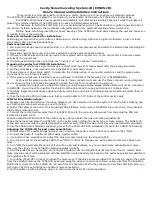
10
9
Resistance (Ohms)
Range Resolution
Max
Accuracy
Display
200
Ω
0.1
Ω
200.0
±(1% +3)
200k
Ω
0.1k
Ω
200.0
±(1% +3)
To Measure Resistance:
1. Turn the power off to the circuit or device that is to be
measured and discharge all capacitors before attempting a
measurement.
2. Plug the black test lead into the COM port and the red test
lead into the + port.
3. Set the rotary switch to the appropriate Ohms range.
4. For correct reading, ensure that the device being tested
contains no voltage.
5. Measure the resistance.
Capacitance Testing
Range Resolution Max Accuracy
Display
200MFD
0.1MFD
199.9 ±(3% +5)
To Measure Capacitance:
1. Disconnect the capacitor from power.
2. Short the terminals to discharge the capacitor.
3. Disconnect any resistors that might be between the termi-
nals of the capacitor.
4. Plug the black test lead into the COM port and the red test
lead into the + port.
5. Set the rotary switch to the MFD position.
6. Connect the test leads to the capacitor and measure the
capacitance.
Diode Check:
To ensure a proper functioning diode, the meter will develop a
voltage across the component from a test current. The diode
test function allows measurements of forward voltage drops
across diode and transistor junctions.
1. Turn off power to the device or circuit that is being tested
and discharge all capacitors.
2. Plug the Black test lead into the port and the Red test lead
into the + port.
3. Set the rotary switch to the position.
4. Connect the test leads to the diode. Normally the forward
voltage drop of a good silicone diode is shown between
0.4V and 0.8V. If the diode under test is defective, “000”
(short circuit) or “OL” (non-conductive) is displayed.
























